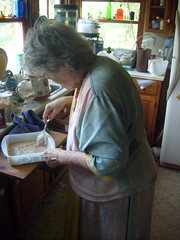
My grandmother Weird Family is one of the most amazing people I know.
Last night I attempted to call her, but didn't hold out much hope of getting through. Her line had been busy, the same annoying beeping, since the news had broke earlier that day and everyone from lawyers to doctors to relatives to friends had rushed to get ahold of her.
When the phone actually started ringing, I felt a thrill of excitement go through me. I'd spoken with her that morning but had had to cut the conversation off, and I was eager to finish up--not that the talk we need to have can ever really end.
The phone picked up.
"Grand Ma?" I asked. No one answered.
"Grand Ma?" I repeated, thinking maybe she'd been distracted by something else in the room. I heard voices talking, but it became apparent within moments that they didn't know I was there.
"Hello?" I called again, very loudly this time. "I can hear you talking!"
No one noticed. They just proceeded with their conversation.
"But, Mom, what's going to happen?" a distressed voice broke through the din. "What's going to happen?"
That's when I stopped yelling and just listened. The voice was that of my Aunt Heroin.
"I'm going to die, H, that's what's going to happen," my grandmother responded. "In about four or five months' time."
"Mom, why do you keep saying that?" my aunt asked, verging on sobs. "Why do you keep saying you're going to die?"
"Because, H, I am," my grandmother insisted. "That's the reality, and I need you to accept it. Everyone else has, including BlackenedBoy and Powell Our Family. I need you to help me in these coming months to get everything in order, to finish what I need to finish. I especially need to sell my house."
"Sell your house?" was my aunt's scratchy reply. "Why?"
"Because, H, I have to, so that I can get some money and divide it up between you all," she said. "I just hope that whoever buys it will allow me to stay there until I go."
A male voice in the background added something to the effect that that would be very nice.
"Isn't there anything they can do?" my aunt pleaded.
"H," my grandmother said, a definite tone of annoyance in her voice now. "My entire liver is cancer. Don't you understand that? I am going to die. Can't you understand?"
"Mom, why are you throwing in the towel?" Aunt Heroin asked.
"I'm not throwing in the towel," my grandmother answered. "I'm eighty-one years old. I'm tired. I'm ready to go. I've lived a full and happy life."
"What about a liver transplant?" H continued, desperate.
"H, for god's sakes, I'm eighty-one years old!" my grandmother exclaimed. "If a fresh liver comes in it should go to someone who's in their thirties, not an old lady!"
"But you beat it before!" my aunt protested. "You beat it before!"
"It was different then, H," my grandmother said. "The first time [of four] I had cancer, I wasn't yet thirty, and I got down on my knees and asked God, 'Lord, please let me raise my children.' And He did. He gave me that. My time now is up. I've done what I need to do. I'm ready to go."
My aunt continued to remonstrate, and the man in the room, a family friend, reassured her.
"Can't you see, H," he said. "She looks good, she feels good--"
"I feel great," my grandmother interjected.
"--she's accepted it," the friend continued. "You need to, too."
This is my grandmother, a resolute, brilliant, flighty genius who remains at eighty-one one of the most dangerously-intelligent people I know.
Though we rarely saw each other because we lived in different states, we spoke often on the phone about family heritage, history, politics, sex, religion, books, writing, our personal lives, and everything in between.
In the years of my adolescence, I came to truly value her as a friend, not just a relative who it was obligatory to love. How many people can say that about a grandparent?
With her wild stories and encyclopedic knowledge, she filled my childhood with magic and mystery, allowed me to believe in the unseen and in something greater than myself.
Her life has been a long and varied one.
Born in Independence City in 1927, she began her childhood as a daughter of fabulous wealth and privilege, a member of one of the most storied dynasties in the United States. In 1929, when she was two years old, her father hemorrhaged $300 million in the stock market crash.
Throughout the early 1930's, their situation dramatically deteriorated.
"I can remember when I first knew that the Depression would change our lives forever," she once told me. "My father left the house in the morning with a Pierce-Arrow, and he came back in a Chevrolet. I hated that ugly car."
The sale of estates across the country wasn't enough to fill the hole of their gaping debt, and after the last of her mother's diamonds were stolen at the Chicago World's Fair in 1933, the family descended into destitution.
She has expressed happiness that events took this turn, for if they hadn't, she said, her life would have been awfully boring.
Her parents, neither of whom had ever worked, found what employment they could, and my grandmother attended public schools in Native State and Hick State, the latter of which she still has a strong attachment to.
She was a schoolgirl of fourteen when the Pearl Harbor attacks took place in 1941, and can remember her entire school gathered in the auditorium on December 8th to listen to President Franklin D. Roosevelt declare the previous day "a date which will live in infamy."
In 1948, when she was my age, she moved to Washington, D.C. and worked for a while as a waitress.
"It was the happiest time of my life," she told me. "I was on my own and free."
For as long as she lived, she maintained a perfect balance between proudly embracing her aristocratic heritage and readily accommodating herself to the realities of a middle class existence, which she never looked down upon.
"My father always told me that if you know how to eat and you know how to speak, you can dine with kings," she was fond of saying. "That's all that matters."
She married my grandfather, a Naval Academy drop-out, in 1950, and began having children shortly thereafter.
Anne, the last of nine siblings who would live past infancy, was born in 1963, when my grandmother was nearing forty.
The family remained in Independence City until Anne was about nine or ten years old, living in a legendary house that I was finally able to see last summer, a large Victorian where one disappearance and at least two separate incidences of levitation were rumored to have occurred.
"That house was haunted," Anne insists to this day.
In the 1970's they relocated to the rural area of Decaying State where many of them still live, including my grandmother. She spent her later years caring for mentally retarded and other disabled patients from her home, a practice she believes was her life's calling and that she continued even after my grandfather died in 2002.
Throughout her life, she's been hit by a car, caught on fire, and stricken with cancer four times, all experiences that I'm sure she would say "built character."
"I was telling Anne earlier today," I said to her on the phone this morning. "That knowing you, you're probably excited about it."
"Oh, yes, I am," she said, a touch of undeniable giddiness making its way into her voice.
"I'm sad, though," I said.
"Oh, don't be sad," she replied.
"I'm not sad that you're going," I said. "I know you want to and I know it's your time, and I'm happy for you in that. I'm just sad because I'm going to miss you."
"Oh, well I'll miss you, too, honey," she said. "But I'll drop in from time to time. In every snowflake, in every rain drop, I'll be there, I'll be there."

No comments:
Post a Comment